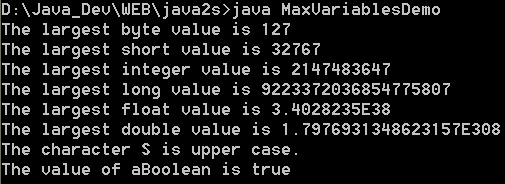Max Variable Length Demo

/* From http://java.sun.com/docs/books/tutorial/index.html */
/*
* Copyright (c) 2006 Sun Microsystems, Inc. All Rights Reserved.
*
* Redistribution and use in source and binary forms, with or without
* modification, are permitted provided that the following conditions are met:
*
* -Redistribution of source code must retain the above copyright notice, this
* list of conditions and the following disclaimer.
*
* -Redistribution in binary form must reproduce the above copyright notice,
* this list of conditions and the following disclaimer in the documentation
* and/or other materials provided with the distribution.
*
* Neither the name of Sun Microsystems, Inc. or the names of contributors may
* be used to endorse or promote products derived from this software without
* specific prior written permission.
*
* This software is provided "AS IS," without a warranty of any kind. ALL
* EXPRESS OR IMPLIED CONDITIONS, REPRESENTATIONS AND WARRANTIES, INCLUDING
* ANY IMPLIED WARRANTY OF MERCHANTABILITY, FITNESS FOR A PARTICULAR PURPOSE
* OR NON-INFRINGEMENT, ARE HEREBY EXCLUDED. SUN MIDROSYSTEMS, INC. ("SUN")
* AND ITS LICENSORS SHALL NOT BE LIABLE FOR ANY DAMAGES SUFFERED BY LICENSEE
* AS A RESULT OF USING, MODIFYING OR DISTRIBUTING THIS SOFTWARE OR ITS
* DERIVATIVES. IN NO EVENT WILL SUN OR ITS LICENSORS BE LIABLE FOR ANY LOST
* REVENUE, PROFIT OR DATA, OR FOR DIRECT, INDIRECT, SPECIAL, CONSEQUENTIAL,
* INCIDENTAL OR PUNITIVE DAMAGES, HOWEVER CAUSED AND REGARDLESS OF THE THEORY
* OF LIABILITY, ARISING OUT OF THE USE OF OR INABILITY TO USE THIS SOFTWARE,
* EVEN IF SUN HAS BEEN ADVISED OF THE POSSIBILITY OF SUCH DAMAGES.
*
* You acknowledge that this software is not designed, licensed or intended
* for use in the design, construction, operation or maintenance of any
* nuclear facility.
*/
public class MaxVariablesDemo {
public static void main(String args[]) {
// integers
byte largestByte = Byte.MAX_VALUE;
short largestShort = Short.MAX_VALUE;
int largestInteger = Integer.MAX_VALUE;
long largestLong = Long.MAX_VALUE;
/* real numbers*/
float largestFloat = Float.MAX_VALUE;
double largestDouble = Double.MAX_VALUE;
// other primitive types
char aChar = 'S';
boolean aBoolean = true;
// display them all
System.out.println("The largest byte value is " + largestByte);
System.out.println("The largest short value is " + largestShort);
System.out.println("The largest integer value is " + largestInteger);
System.out.println("The largest long value is " + largestLong);
System.out.println("The largest float value is " + largestFloat);
System.out.println("The largest double value is " + largestDouble);
if (Character.isUpperCase(aChar)) {
System.out.println("The character " + aChar + " is upper case.");
} else {
System.out.println("The character " + aChar + " is lower case.");
}
System.out.println("The value of aBoolean is " + aBoolean);
}
}
Related examples in the same category